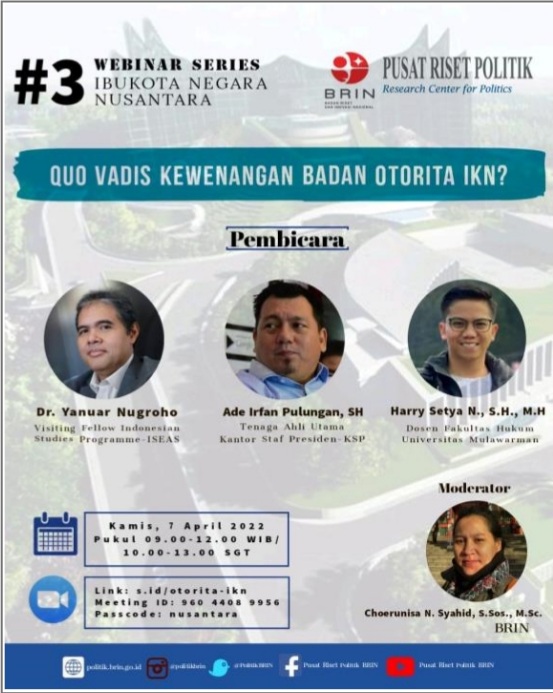Jakarta – BRIN Public Relations. The National Research and Innovation Agency (BRIN) through the Political Research Center in collaboration with ISEAS, held a Series 3 Webinar on the State Capital City (IKN), themed Quovadis the Authority of the IKN Authority, Thursday (7/4). This activity is part of the scientific contribution of academics to the process of forming IKN in Kalimantan.
Head of BRIN’s Social Sciences and Humanities Research Organization (IPSH RO), Ahmad Najib Burhani, hopes that this webinar can produce an academic work, thus providing a solid scientific foundation for the IKN formation process. “The peak will be in October 2022, by holding conferences and workshops,” said Najib.
According to Najib, so far there have been many very serious studies on IKN. However, there is as yet no book that has been thoroughly worked on serving as a reference for the government. While in fact, this very large project will determine the future of the Indonesian nation.
“We want this webinar to provide an academic discourse regarding the authority of the IKN Authority, whether it will be like what happened to the BATAM Authority. We also look at the socio-cultural aspect of the new IKN, for example regarding the management of local culture, and the character of the culture,” said Najib.
On the same occasion, Acting Head of BRIN’s Political Research Center Atiqah Nur Alami said that it is important to review the regulatory aspects, especially the IKN Law and its derivative regulations, especially in the institutional readiness of the IKN authority, because this Board will be responsible for development starting from preparation, transfer, to implementation.
Atiqah said, there are three main issues surrounding regulations and institutions. First, the legislative process, or the drafting of laws. The process of drafting laws and regulations must go through various stages. There are planning, preparation, deliberation, ratification and promulgation. “The deliberation stage takes the longest time, because it involves public participation, in an effort to absorb the people’s aspirations, “explained Atiqah.
Second, public participation has not been fully reflected in the draft IKN Law. Article 33 of the IKN Law mandates community participation, starting from the process of preparation, relocation, development, and management of the national capital. One of them is in the form of public consultation on 22-23 March, on draft implementing regulations of the IKN Law, both government and presidential regulations. “Various inputs can be taken into consideration for the government to perfect the implementing regulations of the IKN Law,” Atiqah added.
Third, the issue of institutionalization of the IKN Authority, especially in terms of authority. According to the IKN Law, this authority agency is a regional government unit, at the provincial level, in which the area is the seat of IKN. What is the relation between the IKN Authority and the North Penajam Paser Regency and Kutai Kartanegara Regency Governments, as well as with the East Kalimantan Provincial Government.
Another important issue, explained Atiqah, is the absence of Regional Representatives Council in the IKN area, which according to the law will indeed be accommodated in the form of a Community Representative Council. This still raises questions regarding the supervisory mechanism that will be set up between the community and the IKN Authority.
In order to discuss these problems, Atiqah hopes that, these various discussions can contribute in academic and practical discourses, not only providing policy recommendations related to the discourse of relocation of the capital city.
“The most important thing, in my opinion, is to improve public awareness and public knowledge. We as a research institution, of course, strive to produce these IKN studies, so that science-based policy making can be realized,” he concluded.
The webinar activity was continued with presentation of materials and discussion. The presenters were among others, Yanuar Nugroho from the Driyarkara School of Philosophy, Jakarta, who discussed “From Jakarta to the Archipelago Understanding the Authority of the State Capital Authority,” Harry Setya Nugraha from Mulawarman University on “Public Participation in the Deliberation of Implementing Regulations of the IKN Law,” Finally, Ade Irfan Pulungan, the Presidential Staff, discussed “Institutional Preparation of the National Capital Authority”. (trs/ed:ns,jml,drs)

